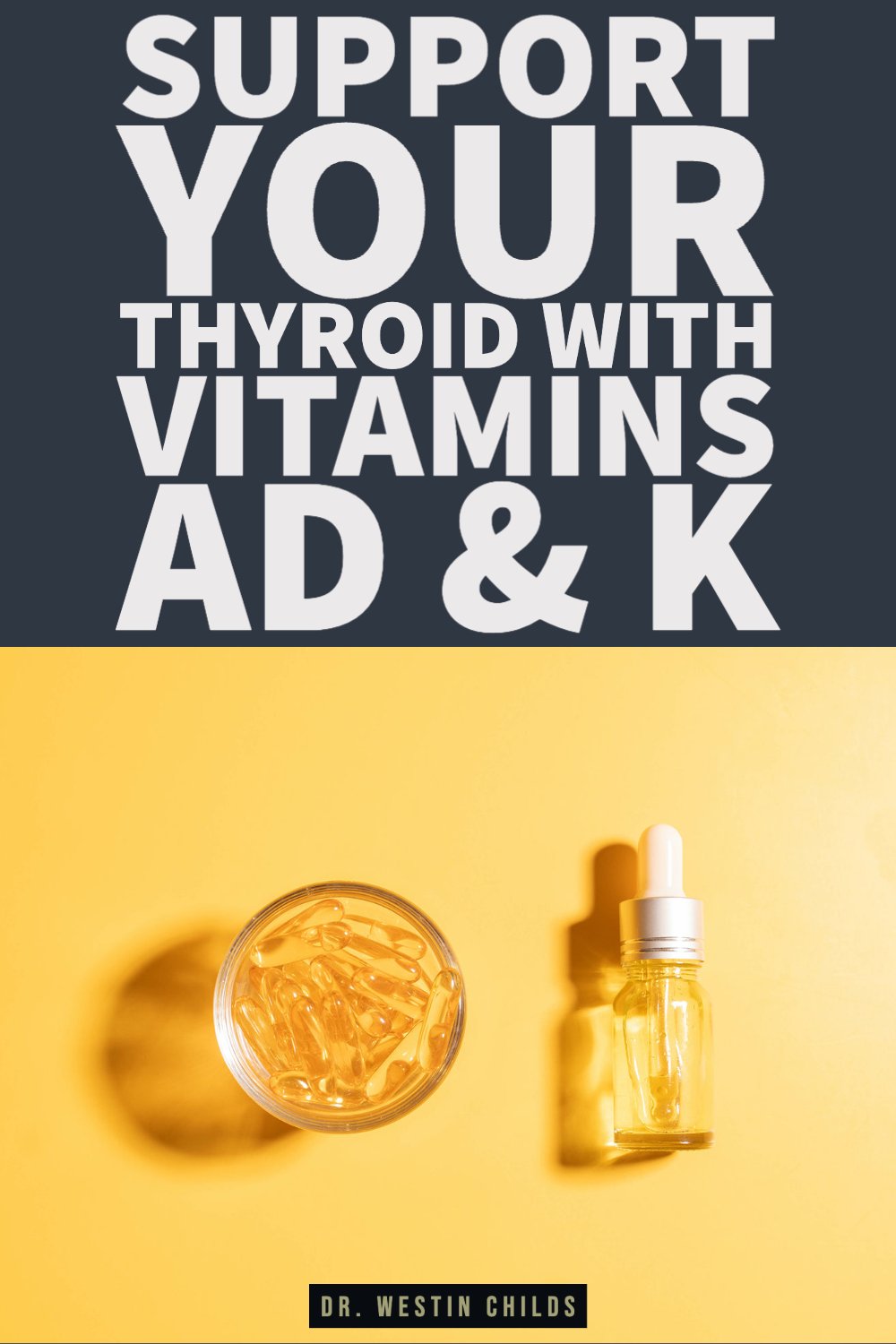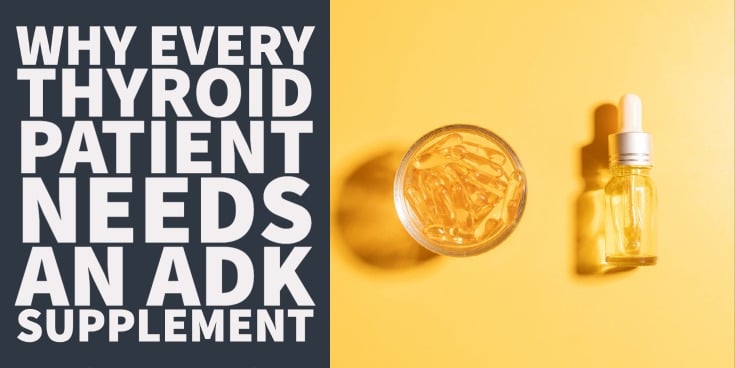Looking for a simple way to boost the effectiveness of your thyroid?
It turns out that enhancing thyroid function doesn’t have to be complicated.
Yes, there will always be times when you need to adjust your thyroid medication and interpret complex thyroid lab test results.
But that isn’t what we are talking about today.
Today I’m talking about a simple set of vitamins, three actually, that can be combined to enhance your thyroid at multiple levels.
What makes this triple combination even more attractive is that the majority of you reading this right now aren’t getting enough of these vitamins.
And, even better is the fact that they provide benefits to your overall health (not just your thyroid).
What combination am I talking about?
Vitamins A, D, and K.
These fat-soluble vitamins can be combined together to provide support to your thyroid gland at multiple levels.
Let’s talk about how it works, why you should take them, and how to take them correctly right now:
DOWNLOAD FREE RESOURCES
Foods to Avoid if you Have Thyroid Problems:
I’ve found that these 10 foods cause the most problems for thyroid patients. Learn which foods you should avoid if you have thyroid disease of any type.
The Complete List of Thyroid Lab tests:
The list includes optimal ranges, normal ranges, and the complete list of tests you need to diagnose and manage thyroid disease correctly!
#1. The Pro-Thyroid Benefits of Vitamin A
I’m going to break down each vitamin one by one and discuss their individual benefits and why they are so important for thyroid patients starting with vitamin A first.
Vitamin A, what is it?
The term vitamin A is used to describe a group of fat-soluble compounds that are essential for human health.
Your body uses these vitamin compounds to modulate the expression of genes in certain areas of your body including your eyes, immune system, reproductive system, heart, lungs, and liver (1).
We aren’t going to focus on these other areas, I’m just pointing out that your body has a big need for vitamin A.
As it relates to your thyroid, we know that vitamin A and thyroid hormone work together to modify the expression of genes.
If vitamin A is not present in sufficient amounts, then your thyroid function will suffer in more ways than one.
The first way is through changes in the shape and function of the thyroid gland.
Yes, you heard me, not getting enough vitamin A may increase your risk of developing structural changes to the thyroid gland like goiter.
Second, it’s required for the healthy function and differentiation of important immune cells called T regulatory cells (Treg for short).
These are the same cells that go haywire in the autoimmune condition known as Hashimoto’s thyroiditis (which many of you reading this may already have).
And third, vitamin A is needed for your body to create and convert thyroid hormones.
To simplify, if you don’t have enough vitamin A then you are putting your thyroid in a situation where:
- It can’t produce the thyroid hormones (2) that it needs including T3 (which means you are at risk for hypothyroidism).
- It can’t protect your thyroid gland from autoimmune attack (which means you are at risk for Hashimoto’s).
- It can’t express the genes it needs for the thyroid gland to operate (which means you are at increased risk for thyroid gland abnormalities and iodine deficiency).
- It’s not as responsive to thyroid hormone at the cellular level (which means you are at risk for thyroid resistance).
It’s pretty clear that your thyroid benefits from and needs adequate amounts of vitamin A.
The question is not whether vitamin A is helpful but whether or not you should be taking more vitamin A in supplement form.
And the answer to that question is easy:
Yes, you probably should.
Data from the National Health and Nutrition Examination Survey (NHANES) showed that 45% of the U.S. population’s vitamin A intake was below the estimated average requirement (3) based on results from 2005 to 2016.
That’s roughly 1 out of 2 people that aren’t getting enough daily vitamin A in their diet!
This is just from the United States, the percentage of people who are vitamin A deficient in developed countries is much higher.
So, not only is it clear that your thyroid needs vitamin A to function, but it’s also clear that thyroid patients would benefit from getting additional vitamin A in supplement form.
There are many different types of vitamin A that you can take and not all are created equal.
Some come already activated which means they can be used immediately by the body (4) and others require additional steps before they can become activated.

For thyroid patients, the more active forms are preferred because the activation of vitamin A in the liver can be impaired by low thyroid function.
For this reason, I prefer to use the form retinyl palmitate at around 2,000 mcg RAE which is the equivalent of 6,666 IU.
The term RAE stands for retinal activity equivalents and is just another way to measure and dose vitamin A.
As long as your daily dose of vitamin A doesn’t exceed 10,000 IUs, you are not at risk of toxicity (especially if you combine your vitamin A with the next supplement we are about to discuss).
#2. The Pro-Thyroid Benefits of Vitamin D3
The next vitamin included in an ADK supplement is vitamin D.
Many people know about vitamin D but I honestly don’t think they appreciate just how important this vitamin is.
In fact, if we were to really get into the weeds, it would probably be more appropriate to refer to vitamin D as a hormone as opposed to a vitamin.
And that’s because most of the tissues and cells in your body have a vitamin D receptor.
If you think about it, vitamin D is much more similar to something like thyroid hormone than it is to something like vitamin A.
Just like vitamin A, vitamin D impacts far more systems in your body than just your thyroid but today I want to focus on its impact on the thyroid.
So what do we know about vitamin D and thyroid function?
Let’s take a look at a study published in 2018 called “The Effects of Vitamin D Supplementation on Thyroid Function in Hypothyroid Patients: A Randomized, Double-Blind, Placebo-Controlled Trial (5)” to explain.
This study took 200 hypothyroid patients (people with a sluggish thyroid) and gave them 50,000 IUs of vitamin D or placebo for 12 weeks.
At the end of the 12 weeks, the researchers found that the hypothyroid patients taking vitamin D experienced:
- Reduced TSH levels (which is a marker of thyroid hormone function and conversion)
- And improved calcium concentrations
- (They didn’t find any difference in T4 and T3 levels in those taking vitamin D)
Right away we see that there is obviously some connection between vitamin D and thyroid function because of the impact that treatment had on TSH levels.
TSH, which stands for thyroid stimulating hormone, is the test that doctors often use to assess thyroid function.
You might be tempted to think that lowering the TSH is bad given that these patients already had a low thyroid but the opposite is true.
A reduction in TSH indicates that these hypothyroid patients experienced BETTER thyroid function as a result of taking vitamin D.
This is likely for several reasons:
The first is that vitamin D is necessary to regulate the immune system and because autoimmune thyroid disease is the number one cause of hypothyroidism in the United States, it’s likely these patients were treating their immune system without realizing it.
And the second is that vitamin D has an impact on TSH binding, meaning that TSH just works more effectively in the presence of vitamin D.
Beyond this study, we also know that vitamin D protects against thyroid cancer and that it has therapeutic potential in hyperthyroidism as well as hypothyroidism.
So, no matter what type of thyroid condition you are experiencing, optimizing your vitamin D will be beneficial.
When it comes to deficiency, it’s estimated that around 42% of the U.S. population isn’t getting enough vitamin D putting it right in line with the same rate of vitamin A deficiency.
In other words, there’s about a 4 in 10 you aren’t getting enough vitamin D if you are reading this.
The best form of vitamin D to take is vitamin D3, by far, with a dose of around 2,000 to 5,000 IUs per day.
Dosing at higher levels may be required for those who are overweight.
#3. The Thyroid-Symptom Related Benefits of Vitamin K2
Number three is vitamin K2 and this one may be more important than the others simply because many people aren’t aware of it.
Unlike vitamins A and D, vitamin K2 provides slightly different benefits to thyroid patients by preventing certain complications associated with thyroid dysfunction.
Here’s what I mean:
The research is very clear that patients with hypothyroidism experience higher rates of heart disease (6) (heart attacks, heart failure, arrhythmias, etc.) and osteoporosis (7) (bone loss) compared to those without thyroid problems.
It just so happens that vitamin K2 may have protective benefits against both of these conditions because of its impact on calcium regulation.
Vitamin K2 (not K1) acts to shuttle calcium to the places that you want it, like your bones, by taking it away from the places that you don’t, the walls of your arteries.
The net effect is a reduction in arterial calcification (8) and an increase in bone mineralization.
Put simply; it makes your heart healthier and your bones stronger.
Vitamin K2 pairs perfectly with D3 which acts to increase calcium in the body.
If you are going to take vitamin D3 as a thyroid patient, then it makes a whole lot of sense to also take vitamin K2 along with it.
Recap
As you can see, these three vitamins work in perfect harmony with one another.
Vitamin A acts to directly improve thyroid hormone production and thyroid cellular activity.
Vitamin D helps to balance the immune system (preventing autoimmune destruction of the thyroid gland), enhances the effectiveness of TSH, increases calcium levels, and prevents vitamin A toxicity.
And vitamin K2 regulates the calcium increase from vitamin D by putting it exactly where you want it, thereby helping to prevent long-term complications.
You can get all of these vitamins in a convenient liquid but make sure you are getting the right forms and the right dosages.
You can see an example of the ideal ratio, dosage, and combination of vitamins in an ADK supplement here.
If you love the idea of supporting your thyroid with specific nutrients and vitamins then I would recommend reading this article next.
It highlights exactly how you can boost thyroid function naturally using the most powerful ingredients available.
Now I want to hear from you:
Are you already taking vitamins A, D, and K?
Are you using the right forms for each of these? What about the right doses?
Are you planning on taking an all-in-one ADK supplement? Why or why not?
Leave your questions or comments below!
Scientific References
#1. ods.od.nih.gov/factsheets/VitaminA-Consumer/
#2. pubmed.ncbi.nlm.nih.gov/23378454/
#3. ncbi.nlm.nih.gov/pmc/articles/PMC7352522/
#4. ncbi.nlm.nih.gov/books/NBK482362/
#5. ncbi.nlm.nih.gov/pmc/articles/PMC6166548/
#6. ncbi.nlm.nih.gov/pmc/articles/PMC7092768/
#7. ncbi.nlm.nih.gov/pmc/articles/PMC7230461/
#8. ncbi.nlm.nih.gov/pmc/articles/PMC4566462/









